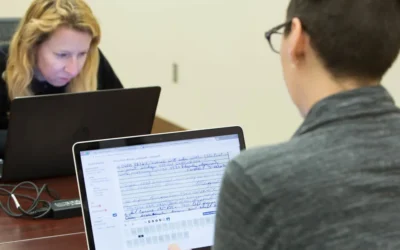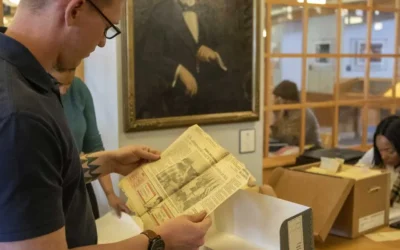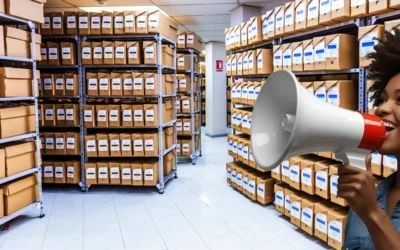The Archives of the Future
Margot Note
No matter what the future of archives holds, fundamental principles will continue to exist. Archives are distinguished from libraries and museums because they must preserve and present authentic records to their users.
Records are documents created during operational activities and serve as primary sources of these activities. If the records become disconnected from the activities that create them, they still may contain useful information, but they are not records.
Saving Context
To be effective tools of history, records need to have their content, structure, and context preserved. The context of records is expressed in their relationships to other records created by the same person. Their original order ties their context to the activity that created them. The archives of the digital era, then, must continue to preserve the content, structure, and context of the records. The records must be preserved in digital form if any of those elements can only be expressed electronically.
The first question when contemplating the archives of the future is how the original order of digital documents will be preserved. The creator’s order may be obscured, because, within a collection of digital documents, arrangement happens automatically by name, type, size, or modification date with a click of the mouse. As a result, the full expression of the relationships and activities may not be fully represented as they are in analog form.
Additionally, within the documents, there may be links to a website or other related documents on the server. How will these relationships be preserved? Are they preservable, especially when considering the transient nature of the Internet?
With these questions and similar ones, archivists will develop best practices to deal with resources that they do not control. In the case of websites, links to resources that are not under the care of the institution will either be ignored or relinked to the site in the Internet Archive or other repository.
Acquisition Redefined
Acquisition will be redefined in this new environment. How will electronic files be donated to the archives? Will certain segments of the server be devoted to the archives, with the materials deemed archival at a certain date? Processing 21st century collections will provide a plethora of challenges. Archivists will continue to create best practices for processing—maximizing access while keeping the “golden minimum” of processing.
Another problem they will continue to face is that of records which can only be read in older formats. So far, possible solutions are too expensive or complex. As the world becomes more digital, standardization of common applications like word processing, like PDF/A, will become increasingly common. As corporations demand and receive applications that can solve this problem, a cost-effective solution can trickle down to archives. Unfortunately, until then, materials in obscure formatting will be preserved until they are usable again, or become so old they cannot run even with the appropriate application.
Amplified Voices
One of the significant benefits of the archives of the future is the ability for even the smallest archive to speak to a larger audience through the web. Many archives may not have the staff, space, or resources available for a reading room, but may be able to present a portion of their collections online. Encoded Archival Descriptions (EAD) and digital collections will make records accessible around the world, affecting local and global communities. In doing so, the role of outreach will change and expand. How will the archives support a strong virtual community, physically hundreds of miles away?
With a web presence, archives will be able to fulfill the information needs of researchers online. Depending on the services and applications, archives may be able to save money this way, as well as preserve the analog records better because they will be handled less.
Researchers may also be able to interact with the records in a Web 2.0 environment, adding their own interpretation or knowledge. For instance, associated items or feedback from the user community may provide more relationships and context for the items. The wisdom of the crowd of users may be harvested to assist archivists in seeing how the records are being used and accessed in order to provide better service. The archivist will be viewed more as a collaborative keeper of information, rather than an unapproachable expert on the material being presented.
A More Welcoming Space
As a result, archives will become more democratic. Online collections will be able to serve and speak to those who would feel intimidated by visiting a physical archives, or whose interests lie more in casual use or curiosity than those of a doctoral student.
The impact of digitization will transform the archives of the future, and to remain relevant, archives must step up to the many challenges presented in preserving electronic documents. Archivists will find ways, individually and as a group, to provide efficient, cost-effective solutions.
Margot Note
Margot Note, archivist, consultant, and author is a regular contributor to Lucidea’s blog and webinar series. Read more of Margot’s posts here and check out ArchivEra, archival collections management software for today’s challenges and tomorrow’s opportunities.
Never miss another post. Subscribe today!
Similar Posts
Collaborative Archival Relationships
Collaborative projects are instrumental in showcasing how archival collections can benefit various organizational departments.
Informational, Evidential, and Intrinsic Values within Archives
Archives provide authentic, reliable information and hold values that reflect their functions and uses; informational, evidential, and intrinsic.
A Sustainable Archives
Archivists prioritize sustainable practices and policies, rooting their work in ethics of care, often preferring digital processing and preservation
Archival Branding and PR Strategies
Archivists who adopt branding and PR strategies both safeguard historical treasures and contribute to their organizations’ evolution.




Leave a Comment
Comments are reviewed and must adhere to our comments policy.
0 Comments